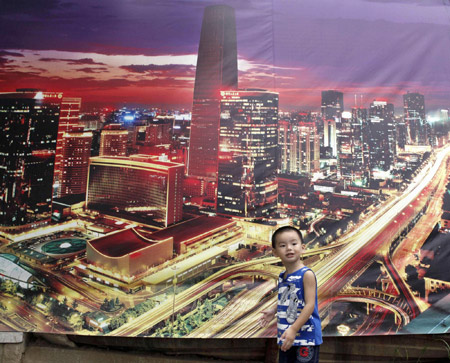Economy
China GDP up 11.1% in 1st half of 2010
By Wang Xiaotian and Gao Qihui (chinadaily.com.cn/Xinhua)
Updated: 2010-07-15 10:21
 |
Large Medium Small |
China's economy grew 11.1 percent year-on-year to hit 17.28 trillion yuan ($2.55 trillion) in the first six months, the National Bureau of Statistics (NBS) said Thursday.
The gross domestic product (GDP) rose 10.3 percent in the second quarter over a year earlier, slowing from the 11.9 percent growth in the first three months, according to the NBS.
|
 A boy walks past a billboard that shows the Central Business District in Beijing, July 15, 2010. China's economy grew 11.1 percent year-on-year to hit 17.28 trillion yuan ($2.55 trillion) in the first half of this year. [Photo/Agencies] |
"A slowdown in the growth rate will benefit the economy because it will prevent it from growing too fast and being overheated," said Sheng Laiyun,?a NBS?spokesman, Thursday.
June CPI rises 2.9%
The consumer inflation eased to 2.9 percent in June from May's 3.1 percent.
It was below the 3 percent target ceiling for the year set by the government in March.
In the first six months, consumer prices in China's urban areas increased 2.5 percent and in rural regions by 2.8 percent. Food prices, which account for about a third of the weighting in calculating the CPI, gained 5.5 percent.
In June alone, food prices rose 5.7 percent year on year, according to the NBS.
"China's inflation in the first half was mild and within the range of management," Sheng told a news conference.
China's producer price index (PPI) grew 6.4 percent year on year in June, Sheng said, adding the figure for the first six months was 6.0 percent up from a year ago.
Retail sales up 18.2% in H1
China's retail sales grew 18.2 percent to 7.27 trillion yuan in the first half of the year from a year earlier, according to the NBS.
Urban consumption hit 6.27 trillion yuan in the first six months, up 18.6 percent from a year earlier, while rural residents spent 1 trillion yuan, up 15.6 percent.
China's auto sales in the first half of the year rose 37.1 percent from a year earlier, furniture sales were up 38.5 percent and home appliances sales climbed 28.8 percent.
The government rolled out a series of incentives early 2009 to bolster consumption to counter fallout from the global economic downturn, including subsidies for home appliances in rural areas and tax breaks for auto purchases, among others.
Fixed-asset investment up 25% in H1
China's fixed-asset investment in the first six months rose 25.0 percent year on year to 11.42 trillion yuan.
Urban fixed-asset investment rose to 9.80 trillion yuan in the first six months, up 25.5 percent from a year earlier.
Rural fixed-asset investment expanded to 1.61 trillion yuan in the first six months, up 22.1 percent from a year earlier.
In urban fixed-asset investment, total investment in the primary sector (including farming, fishing and forestry) expanded 17.8 percent from a year earlier.
The industrial sector saw investment up 22.3 percent and investment in the tertiary sector, which covers commerce, finance and services, up 28.4 percent.
In terms of regions, central China rose the most by 28 percent in fixed-asset investment in the first six months from a year earlier, while western China increased 27.3 percent and eastern China climbed 22.4 percent.
Property market investment grew 38.1 percent to 1.97 trillion yuan in the first six months, up 38.1 percent from a year earlier.
Income increases for urban, rural residents in H1
The income of China's urban and rural residents continued to increase in the first half of the year, data from the NBS showed.
In the first six months of the year, per-capita disposable income for urban people reached 9,757 yuan, up 10.2 percent year on year. After deducting inflation, though, actual growth was 7.5 percent, said?Sheng.
Per-capita cash income for rural residents stood at 3,078 yuan in the first half of the year, and the actual growth was 9.5 percent after deducting inflation, according to Sheng.




